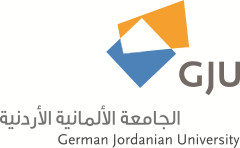German-Jordanian University
Coordinates: 32°1′32″N 35°52′38″E / 32.02556°N 35.87722°E
| German Jordanian University | |
|---|---|
| الجامعة الالمانيه الاردنية | |
 | |
| Established | 2005 |
| Type | Public |
| Undergraduates | 2,800, 41% female[1] |
| Location | Amman, Jordan |
| Nickname | GJU |
| Website | German Jordanian University |
The German Jordanian University (GJU) (ar: الجامعة الالمانيه الاردنية), often abbreviated GJU, is a state-supported university located in Madaba at Al Mushaqqar. The university provides the student body with a variety of degrees, and differs from other Jordanian universities by offering German language courses, with the chance for students to visit and study in Germany for their fourth academic year. During that year, the students are given the chance to study a complete semester in one of the German universities of applied sciences and to be introduced to German industry.
History
The German Jordanian University (GJU) is a public university located in Al-Mushaqqar, Naour, on the Amman–Madaba Highway. It is a public university with academic distinction in teaching, research and community service. The university is oriented to the German Fachhochschule (“university of applied sciences”) model in teaching its undergraduate and graduate programs. GJU focuses on providing applied study programs of highest quality.[citation needed]
Financial support
GJU receives government aid through the German Academic Exchange Service (DAAD) and the Federal Ministry of Education and Research (Germany) and also the State of Saxony-Anhalt and the Magdeburg-Stendal University of Applied Sciences are contributing. Also, there are first commitments from the Jordanian private sector concerning financial support. The Jordanian government pays its part from resources stemming from a debt swap agreement.
Schools and programs at GJU
School of Applied Technical Sciences
- B.Sc. Industrial Engineering
- B.Sc. Mechatronics Engineering
- B.Sc. Mechanical And Maintenance Engineering
School of Natural Resources Engineering and Management
- B.Sc. Energy Engineering
- B.Sc. Water and Environmental Engineering
School of Applied Medical Sciences
- B.Sc. Biomedical Engineering
- B.Sc. Pharmaceutical Chemical Engineering
- M.Sc. Vision Rehabilitation
School of Management and Logistic Sciences
B.A Management Sciences B.A International Accounting B.Sc. Logistic Sciences
School of Computer Engineering and Information Technology
- B.Sc. Computer Science
- B.Sc. Computer Engineering
- B.Sc. Communication Engineering
School of Architecture and Built Environment
- B.Sc. Architecture
- B.Sc. Architecture / Interior Architecture
- B.A. Design and Visual Communication
- M.Sc. Spatial Planning
- M.Sc. Architectural Conservation
School of Languages
- B.A. Translation: German/English/Arabic
- B.A. German & English for Business & Applied Studies
- M.A. German as a Foreign Language
- M.A. Translation: German/English/Arabic
Talal Abu-Ghazaleh Graduate School of Business
- Master of Business Administration (MBA)
The role of the German Fachhochschulen (universities of applied sciences)
In close cooperation with the Magdeburg-Stendal University of Applied Science, the project team has already bound about seventy dedicated German universities of applied sciences to a cooperating consortium. Its members will support the designing of the study programmes' curricula, the recruiting and selection of qualified German academic staff and host students during their German year. The consortium is open to more German-language universities of applied sciences who are interested in joining the project.
The five-year study programmes at the GJU will be designed following the model of the German Fachhochschulen (universities of applied sciences). These universities are mainly characterised by their philosophy of strict relation to practice and their application oriented approach to knowledge transfer. The percentage of German professors among academic staff will be high. Studying comprises a large amount of German and English as foreign language lessons; after an initial phase in English, courses will be taught predominantly in German. Regional studies, as well as cross-cultural communication, are part of the curricula.
The founding process of the GJU takes place on a high-ranking political and institutional level in both countries; the new university is generally perceived as an additional contribution to traditionally excellent relations between the two countries. Its philosophy aims at an ambitious, excellent and reputable training of young people who will move back and forth between Europe and the Middle East, culturally at ease. With professional know-how they will economically and in many other ways strengthen and embellish existing good relations.
Future
The new campus in Madaba is planned to contain five thousand students. It is designed in a way to help people with special needs.
References
External links
- http://www.german-jordanian.org [German Projekt Office of the German-Jordanian University]
- http://www.gju.edu.jo [German-Jordanian University]
- http://www.tagcb.gju.edu.jo [German-Jordanian University (Talal Abu-Ghazaleh College of Business)]
- https://eduwave.gju.edu.jo/eduwave/ [ German-Jordanian University ( online registration system ) ]